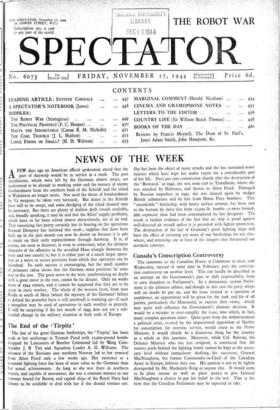Canada's Conscription Controversy
The summons to the Canadian House of Commons to meet next Wednesday, instead of some time in February, puts the conscrip- tion controversy on another level. This can hardly be described as an attempt on the Government's part to shift responsibility from its own shoulders to Parliament's. In a democratic system Parlia- ment is the ultimate arbiter, and though in this case the party whips will no doubt be put on, and the issue treated as a question of confidence, an opportunity will be given for the rank and file of all parties, particularly the Ministerial, to express their views, which may quite well influence the Government's ultimate decision. It would be a mistake to over-simplify the issue, into which, in fact, many complex questions enter. Quite apart from the embarrassment a political crisis, created by the impassioned opposition of Quebec for conscription for overseas service, would cause to the Prime Minister, it would clearly be a disastrous thing for the country as a whole at this juncture. Moreover, while Col. Ralston, the Defence Minister who has just resigned, is convinced that the reserve pools behind the fighting fronts cannot be kept at the neces- sary level without compulsory drafting, his successor, General MacNaughton, the former Commander-in-Chief of the Canadian Army in Europe, believes they can. His opinion is not to be lightly disregarded by Mr. Mackenzie King or anyone else. It would seem to be plain reason as well as plain justice to give General MacNaughton a chance to put his belief to the test. That is the view that the Canadian Parliament may be expected to take.


























